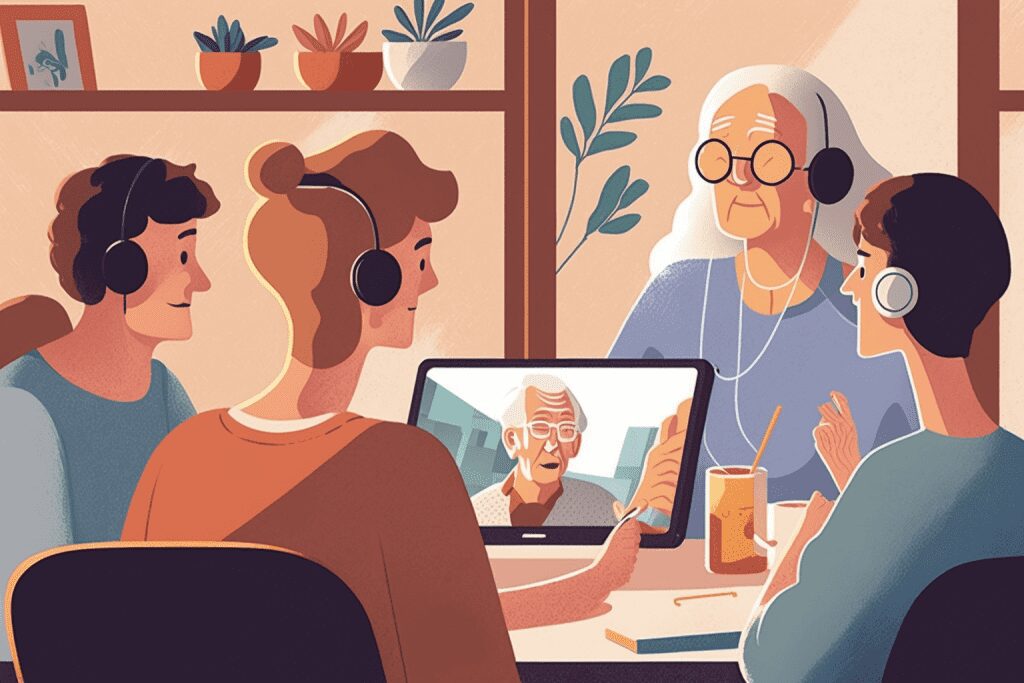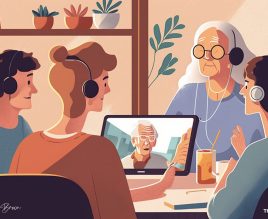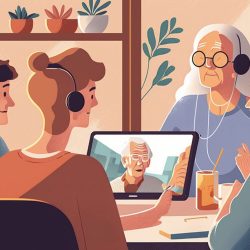Table of Contents
ToggleAs the world propels further into the digital era, we are witnessing a remarkable blending of age and technology. The senior community, traditionally perceived as less tech-savvy, is now tapping into the empowering force of online resources in pursuit of lifelong learning. No longer are classrooms confined to four walls; instead, they exist virtually, right at the fingertips of those eager to learn. This is not simply an age of remote learning, but an era where it’s never too late to learn.
With the advent of remote learning, virtual classrooms, and online certification programs, seniors are exploring new horizons with unbridled curiosity. Their desire for personal development and cognitive enrichment defies the age-old stereotype of the technologically inept senior citizen.
Although remote learning for seniors may seem like a contemporary concept, it holds profound implications for society as a whole. Picture this: a grandmother in her 70s learns digital marketing and creates a successful online business. Or consider a retired veteran who explores the complexities of climate change through a virtual course, later becoming an advocate for sustainable living in his community.
By leveraging technology’s potential, seniors are proving that learning has no age limit. However, this novel approach does come with challenges and considerations unique to this demographic. As we delve into this intriguing fusion of age, technology, and education, we’ll examine the current trends, advantages, potential obstacles, and future potential of remote learning for the senior community. Welcome to the age of limitless learning.
Remote Learning Advantages for Seniors
Remote learning presents a realm of benefits for seniors, fostering intellectual curiosity while catering to their unique needs. From flexibility and convenience to personalized pace and schedule adaptation, it has redefined the traditional confines of education. Let’s examine the fundamental advantages that make online learning a suitable choice for the senior community.

Flexibility and Convenience
One of the most compelling advantages of remote learning for seniors is its flexibility and convenience. It provides learning opportunities that transcend geographical boundaries, enabling seniors to connect to the world’s knowledge from the comfort of their homes. This level of accessibility is especially significant for seniors who may face mobility challenges or those living in rural areas with limited educational resources.
Seniors are free to choose from a myriad of subjects, regardless of their previous educational background. Whether they want to learn a new language, delve into the mysteries of astronomy, or acquire digital marketing skills, the choices are virtually limitless. They can easily browse through multiple platforms offering various courses and choose those that align with their interests and objectives.
Moreover, remote learning eliminates the hassle of commuting. This not only saves time but also reduces the physical strain often associated with travel. This convenience can significantly enhance seniors’ willingness and ability to learn, making education a more enjoyable and less strenuous experience.
Learning at One’s Own Pace
Another advantage of remote learning is that it allows seniors to learn at their own pace. Traditional classroom settings often follow a fixed schedule, which can sometimes create unnecessary pressure, particularly for senior learners. However, online education typically offers self-paced learning, where course materials can be accessed anytime.
For seniors, this means they can spend more time understanding complex concepts or fast-track through familiar topics. If they wish to revisit a particular lesson, they can do so without feeling left behind. This flexibility accommodates varying learning speeds and cognitive capabilities, making education more personalized and less intimidating for seniors.
Adapting to Individual Schedules
In addition to learning pace, remote education can adapt to individual schedules. Seniors often juggle various responsibilities, including family commitments, health routines, or personal hobbies. With remote learning, they can tailor their study schedule around their daily activities.
Courses can be taken early in the morning, late in the evening, or any time that suits their routine. This flexibility allows seniors to maintain a balanced lifestyle while pursuing their educational goals. Furthermore, with the option to pause and resume coursework, seniors can learn without disrupting their established routines, providing a seamless integration of education into their daily lives.
A Wide Range of Subjects
With remote learning, seniors have an unprecedented opportunity to expand their intellectual horizons. A retiree with an interest in history can explore ancient civilizations, while a grandparent can understand the basics of coding to communicate better with their tech-savvy grandchildren.
Online courses allow seniors to explore different fields, from humanities and social sciences to technology and business. They might dive into literature from various epochs, understand scientific phenomena, or learn about the global economy’s intricacies. This opportunity for continuous exploration not only stimulates cognitive function but also promotes a sense of personal fulfillment.
Whether they’re enriching their knowledge base or starting on a completely new subject, remote learning offers seniors a pathway to broaden their perspective, foster intellectual growth, and enhance their lives.
Catering to Diverse Interests
Remote learning is not only about academic pursuits; it’s equally adept at catering to seniors’ diverse interests. For those keen on creative arts, there are online classes for painting, writing, photography, or music. Seniors interested in health and wellness can find courses on yoga, meditation, or nutrition.
The digital world also hosts a myriad of hobby-oriented courses like gardening, cooking, and bird-watching. Furthermore, seniors with entrepreneurial aspirations can take courses in entrepreneurship, e-commerce, or digital marketing to transform their business ideas into reality.
Ultimately, online learning platforms provide a meeting ground for academic curiosity and personal passion. They validate the age-old saying, “You’re never too old to learn,” encouraging seniors to follow their interests, discover new passions, and lead enriched, fulfilling lives.
Popular Platforms and Programs for Seniors
With an array of educational platforms available today, seniors can find tailored resources that cater to their learning preferences and needs. Ranging from Massive Open Online Courses (MOOCs) to university-led initiatives, these platforms deliver diverse and flexible learning opportunities. Let’s delve deeper into these popular platforms and how they serve the senior community.

Massive Open Online Courses (Moocs)
Massive Open Online Courses (MOOCs) have revolutionized the educational landscape by offering accessible, flexible, and varied learning opportunities. These platforms host thousands of courses from universities around the globe, making top-tier education accessible to anyone with an internet connection.
Seniors can find courses on virtually any subject—literature, mathematics, computer science, business, and more. These courses often come with video lectures, interactive quizzes, discussion forums, and reading materials, providing an immersive learning experience.
Additionally, MOOCs often offer certification upon completion, giving tangible recognition to seniors’ learning endeavors. These certificates can be shared on professional networks like LinkedIn, showcasing their learning commitment and skills to the world. Platforms like Coursera, edX, and FutureLearn are popular MOOC providers that host an extensive range of courses suitable for seniors.
University-Led Initiatives
In addition to MOOCs, several universities offer specialized online programs targeting senior learners. These initiatives provide an opportunity for seniors to engage with academic material, take part in stimulating discussions, and even earn certification upon completion.
For example, the University of the Third Age (U3A) offers online and offline courses specifically designed for seniors. Similarly, Harvard University’s Institute for Learning in Retirement and University of Oxford’s Department for Continuing Education provide diverse courses that cater to the senior demographic.
Such programs often consider the unique learning needs and pace of seniors, ensuring an inclusive and comfortable learning environment. By participating in these initiatives, seniors can stay intellectually engaged, connect with like-minded peers, and continue their lifelong learning journey.
Benefits of Online Certifications
Online certifications provide a tangible value to the learning journey, serving as a testament to the time and effort invested in personal development. But their value extends beyond mere credentials. Online certifications can help seniors enhance their skillsets and contribute significantly to their personal enrichment. Let’s delve into how these certifications offer more than just a certificate of completion.
Enhancing Skillsets
Online certification programs allow seniors to build on their existing knowledge base and acquire new skills. For instance, seniors can learn digital skills like social media management, website building, or digital marketing that can be put to practical use, such as managing a small business or volunteering for a community organization.
These certifications can also help seniors stay up-to-date in a rapidly changing world, allowing them to understand and engage with modern technologies and trends. Skills acquired through these programs can help seniors navigate the digital world with confidence, enhancing their independence and self-efficacy.
Moreover, online certifications can also facilitate career transitions. For seniors contemplating a late-career change or thinking of returning to the workforce, certification in relevant fields can make them competitive candidates and open up new job opportunities.
Personal Development And Enrichment
Beyond practical skills and career prospects, online certifications contribute significantly to seniors’ personal development and enrichment. Acquiring new knowledge or skills can boost self-esteem and confidence, making seniors feel more connected and engaged with the world. Engaging in learning can also provide a sense of purpose. Pursuing an online certification in a subject of interest can be a fulfilling endeavor, fostering a feeling of achievement and satisfaction.
Moreover, learning stimulates cognitive activity, contributing to mental well-being. It can help seniors keep their minds sharp, improve memory, and potentially slow cognitive decline. The process of learning can help seniors expand their social networks. Online courses often include discussion forums where learners can interact, allowing seniors to connect with people from different backgrounds, cultures, and generations.
Overcoming Challenges and Accessibility Concerns
While remote learning offers ample benefits, it’s not without its challenges, particularly for the senior community. The most prominent among these are technological barriers that could hinder seniors’ online learning experience. However, with the right strategies and resources, these obstacles can be effectively addressed. Let’s delve into ways to simplify user interfaces and provide tech support to make online learning more accessible for seniors.
Simplifying User Interfaces
One effective approach to address seniors’ technological barriers is to simplify user interfaces on learning platforms. A clean, straightforward design with clear instructions can significantly enhance the user experience for seniors. Larger fonts, contrasting colors, and intuitive navigation menus can make online platforms more accessible and user-friendly.
Many online learning platforms are incorporating these design principles. For instance, having a “senior mode” with enhanced accessibility features, like zoom options and text-to-speech functions, can make a world of difference.
Another crucial aspect is ensuring that the course content is presented in an easy-to-understand format. Video lectures with captions, transcripts for audio content, and straightforward language can make learning materials more digestible for seniors.
Providing Tech Support and Tutorials
Tech support and tutorials play a vital role in helping seniors overcome technological challenges. Many online learning platforms provide 24/7 tech support to assist learners in resolving any technical issues they might encounter. This assistance can help seniors navigate the platform more confidently, reducing the stress associated with potential tech problems.
Further, tutorials designed to guide seniors through the online learning process can be incredibly beneficial. These can include guides on how to use the learning platform, how to participate in discussion forums, or how to access course materials.
Community centers and libraries often provide free or affordable tech classes for seniors. These classes cover essential skills like using a computer or smartphone, navigating the internet, and understanding online safety. By providing the necessary support and guidance, seniors can become more comfortable with technology, paving the way for a more rewarding and less stressful learning experience.
Building Support Networks
Having a robust support network can significantly enhance the online learning experience for seniors. Interacting with peers, sharing experiences, and seeking advice can make the learning journey less isolating and more enriching. Senior-focused online communities and local resources play a pivotal role in creating such support networks. Let’s delve into how these avenues can contribute to a more interactive and fulfilling learning experience.

Senior-Focused Online Communities
Online communities cater specifically to the senior demographic, providing a platform for social interaction and mutual support. These communities are not just limited to learning platforms; they extend to various social media groups, forums, and virtual clubs.
Within these communities, seniors can discuss course content, clarify doubts, share learning experiences, and even form study groups. Such interactions can lead to a deeper understanding of the subject matter and make the learning process more enjoyable.
Additionally, these communities provide a sense of belonging and camaraderie. Seniors can connect with like-minded individuals from all over the world, fostering new friendships and reducing feelings of isolation. Such social connections can enhance mental well-being and contribute to a more holistic learning experience.
Leveraging Local Resources
In addition to online communities, local resources can also provide valuable support for seniors engaged in remote learning. Community centers, libraries, and senior centers often offer resources to assist with online education.
These resources may include tech training workshops, study groups, or even access to computers and internet services. For seniors with limited digital access at home, these facilities can be a lifeline for their online learning endeavors.
Moreover, community-based organizations often host events and workshops on a variety of subjects. Participating in these can complement online learning and provide opportunities for real-world application of newly learned skills.
Leveraging these local resources can not only support seniors’ learning journey but also foster a sense of community and connection, contributing to a more enriching and enjoyable educational experience.
The Future of Remote Learning for the Senior Community
As technology continues to evolve, the future of remote learning for the senior community looks promising. Advancements in artificial intelligence and machine learning are set to further personalize the online learning experience, catering more effectively to individual needs and preferences.
Learning platforms will likely become more intuitive and user-friendly, with adaptive interfaces and content delivery tailored to seniors’ pace and cognitive abilities. Virtual reality and augmented reality technologies may provide immersive learning experiences, making online education even more engaging.
However, the true potential of these technologies will only be realized if accessibility issues are addressed. Efforts must be made to ensure that seniors, regardless of their tech proficiency or socio-economic background, can benefit from these advancements. This includes not only improving the accessibility of learning platforms but also providing affordable internet services and digital devices.
Additionally, personalized learning paths could take center stage in the future. Machine learning algorithms can help create individualized learning plans based on seniors’ interests, learning pace, and skill level. This personalization can make learning more relevant, enjoyable, and ultimately, more effective.
In conclusion, the future of remote learning for the senior community is poised for significant growth and transformation. With the right strategies, technological advancements, and a focus on inclusivity, remote learning can truly become a powerful tool for lifelong learning, personal growth, and enrichment for seniors worldwide.
Conclusion
Remote learning has undeniably brought a significant shift in senior education, transforming the way older adults engage in lifelong learning. The convenience, flexibility, and diverse offerings of online education have opened a world of possibilities for seniors, from learning new skills to pursuing personal passions.
The lasting impact of this trend extends beyond education. Remote learning has empowered seniors, enabling them to stay mentally active, socially connected, and engaged with the world. It has fostered a sense of accomplishment and boosted self-confidence, contributing to their overall well-being.
Encouraging seniors to embrace these new learning opportunities is crucial. Whether it’s helping them navigate technology, providing emotional support, or celebrating their achievements, every effort counts. With the right support and resources, seniors can fully leverage the potential of remote learning and continue their lifelong learning journey.
FAQs
Is Remote Learning Effective For Seniors?
Yes, remote learning can be highly effective for seniors. It offers flexibility, allowing seniors to learn at their own pace and convenience. A wide range of subjects caters to diverse interests, and interactive learning methods promote engagement. With the right support to navigate technology, seniors can significantly benefit from online education.
How Do I Choose The Right Online Course Or Certification Program?
Consider your interests, learning goals, and the time you’re willing to commit. Research various platforms offering courses in your area of interest. Check the course content, duration, and reviews from other learners. Some platforms offer free trials or previews, which can help in decision-making.
Are There Any Free Resources Available For Seniors?
Yes, several platforms offer free courses for seniors. Massive Open Online Courses (MOOCs) like Coursera and edX have free courses in various subjects. Public libraries often provide free resources and workshops. Community centers also offer free or affordable tech training programs.
How Do I Stay Motivated While Learning Remotely?
Set clear learning goals and establish a routine. Engage in courses that interest you. Participate in online discussions and try to apply your learning in real life. Celebrate small milestones and keep reminding yourself of the benefits of continuous learning.
Can Seniors Benefit From Pursuing Online Certifications?
Absolutely! Online certifications not only validate the skills and knowledge acquired but also contribute to personal enrichment. They boost confidence, provide a sense of accomplishment, and can open up new opportunities for social engagement or even career transitions.
How Can I Overcome Technology-Related Challenges?
Utilize resources like tech tutorials and support services provided by learning platforms. Consider attending tech workshops at local community centers or libraries. If you have friends or family members who are tech-savvy, don’t hesitate to seek their help. With patience and practice, navigating technology will become easier.
Reference
- https://graduate.northeastern.edu/
- https://www.london.ac.uk/
- https://www.nu.edu/

















